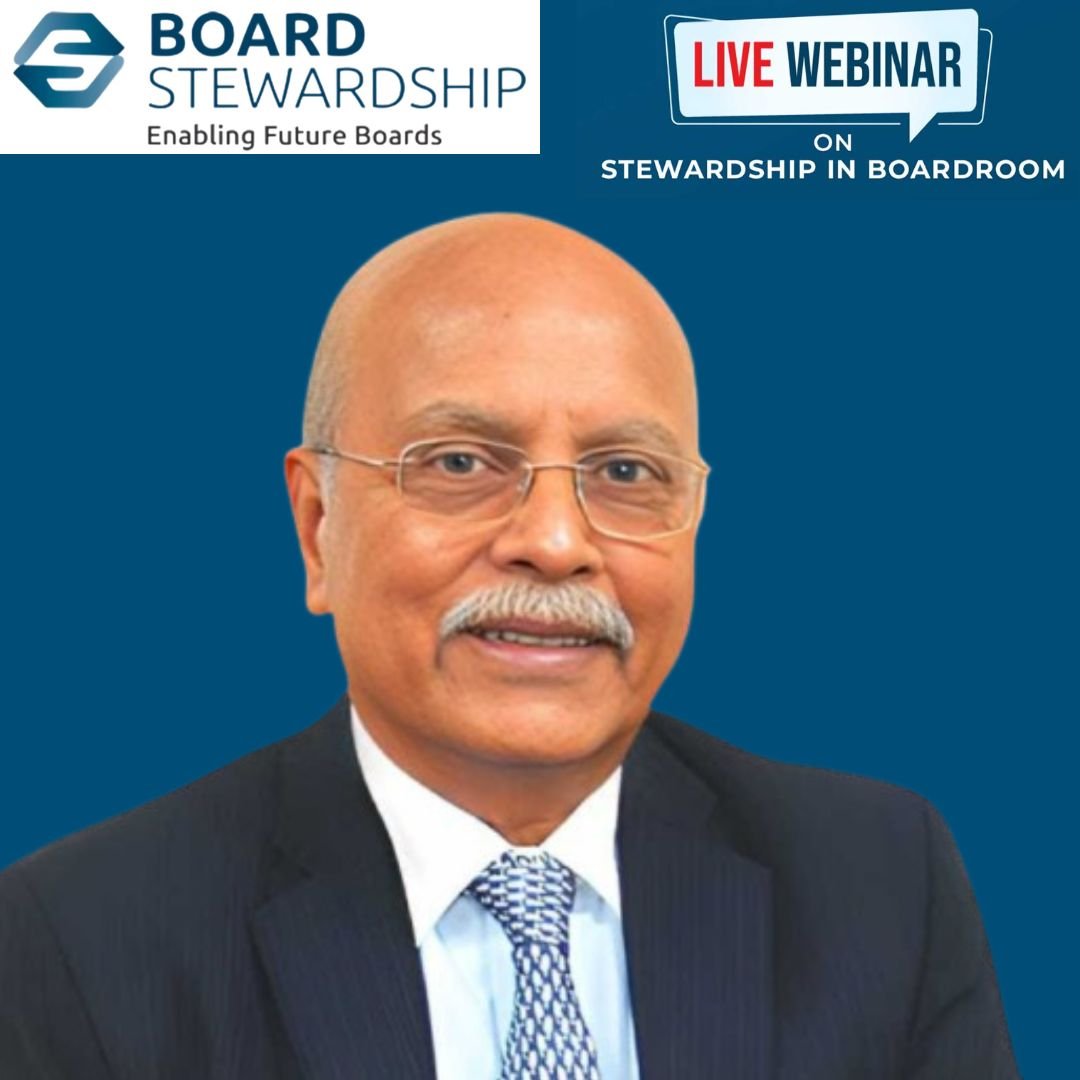
Signals and Safeguards: Boardroom Stewardship in Action – A Keynote Address by Shailesh Haribhakti
Board Stewardship organised ‘Stewardship in the Boardroom’, its monthly webinar series that serves as a platform for engaging and insightful discussions on governance in the boardroom. As a trusted enabler of future-ready Boards, Board Stewardship was pleased to host a high-impact live session titled “Signals and Safeguards: Boardroom Stewardship in Action.”
Excerpts from the Keynote Address delivered by Shailesh Haribhakti, Non-Executive Chairman & Independent Director on multiple Boards and Chairman of the Advisory Board of Board Stewardship.
Good afternoon, fellow Directors, industry stewards, and champions of integrity,
It is my pleasure to open this timely and essential dialogue on “Signals and Safeguards: Boardroom Stewardship in Action.” The gravity of this moment—when global uncertainty, technological acceleration, and stakeholder expectations collide—demands a fundamental rethinking of how Boards read, interpret, and respond to the signals around them. It demands that we transform from gatekeepers into guardians, from compliance-driven custodians into courageous stewards.
We meet today in a world undergoing tectonic shifts. The age of unipolar dominance is giving way to a multipolar world order where alliances are fluid, markets are fragmented, and the rules of engagement are being rewritten in real time. This volatility is not temporary—it is systemic. For corporate leaders, it translates into a renewed call for resilience: the ability to reallocate costs, reassign people, and repurpose facilities in ways that are not just efficient but also ethical and empathetic.
To thrive, we must not only operate with agility but also with moral clarity. The enterprises that will endure are those that are hyperlocal in operations yet universal in values. These are the organisations that will right-size, right-scale, and rise to meet the needs of a borderless, climate-conscious, AI-integrated world.
Our first focus today is on boardroom stewardship and the role of proxy reports. In an age of data transparency and active shareholders, these reports are no longer just checklists—they are mirrors that reflect how seriously Boards take ESG, succession planning, diversity, CEO pay, cyber risk, and climate commitments. But the true test of stewardship lies not in reading the reports but in owning the response. When shareholder activists raise concerns, do we brush them aside or lean in to understand? When proxy advisors flag vulnerabilities, do we react with defensiveness or diligence? The modern boardroom must become both a listening post and a lighthouse—decoding signals from whistleblower complaints to digital reputation alerts, and acting with informed humility. Stewardship is no longer about avoiding scrutiny but embracing it, transforming signals into strategic actions that build credibility, confidence, and capital.
We then turn to the importance of internal investigations, especially in a time when fraud goes far beyond financial misstatements. Today, threats emerge from deep fakes, cyber intrusions, ESG washing, green fraud, and algorithmic bias. While internal audit teams and statutory audits play critical roles, it is increasingly the independent internal investigation—initiated by the Board or Audit Committee—that sets the gold standard. This demands a forensic mindset, integrating AI tools, natural language processing, pattern detection, and deep cultural inquiry. Boards must empower ethics officers, foster speak-up cultures, and create environments where truth can safely surface. These investigations should go beyond damage control and become learning moments—opportunities to tighten controls, refine risk appetite, and reinforce core values. Fraud thrives in silence; integrity thrives when the Board steps up as the ultimate moral compass.
Equally important is the protection and empowerment of Independent Directors. Our governance architecture rests heavily on their courage, clarity, and objectivity. Yet today, they face rising expectations alongside rising personal risks—from criminal liabilities in fraud cases to reputational damage in shareholder disputes. Boards must institutionalise mechanisms to protect them with a multi-layered approach that includes comprehensive inductions to company risk hotspots, access to real-time intelligence including whistleblower dashboards and cultural diagnostics, and robust legal safeguards such as indemnity, D&O insurance, and access to independent counsel. An Independent Director who is protected and informed becomes a true steward—fearless in pursuit of long-term value.
These discussions gain added urgency as we step into the era of Manufacturing 6.0. As the world grapples with climate crises, disrupted supply chains, and digital divides, we are entering an age where success is redefined. Boards must lead the shift from “Make where it’s cheap” to “Manufacture where demand exists.” Manufacturing 6.0 will be marked by agile and distributed manufacturing nodes, AI-designed products tailored to local needs, sensor-driven waste reduction, and carbon-neutral operations powered by circular supply chains. But more than operational redesign, this is also the age of values-based enterprise—where impact is measured not only in EBITDA, but in carbon saved, communities uplifted, and credibility earned. Companies that will thrive are not just profitable, but purposeful, pluralistic, and planet-positive.
So, as we engage in this conversation on “Signals and Safeguards,” let us remember that we are not merely exchanging best practices. We are shaping a philosophy of governance—one that urges us to read more deeply, respond more swiftly, investigate more truthfully, protect more courageously, and scale more sustainably. This is the new stewardship. It is not silent nor symbolic, but transformative.
Let us rise to it, together.




